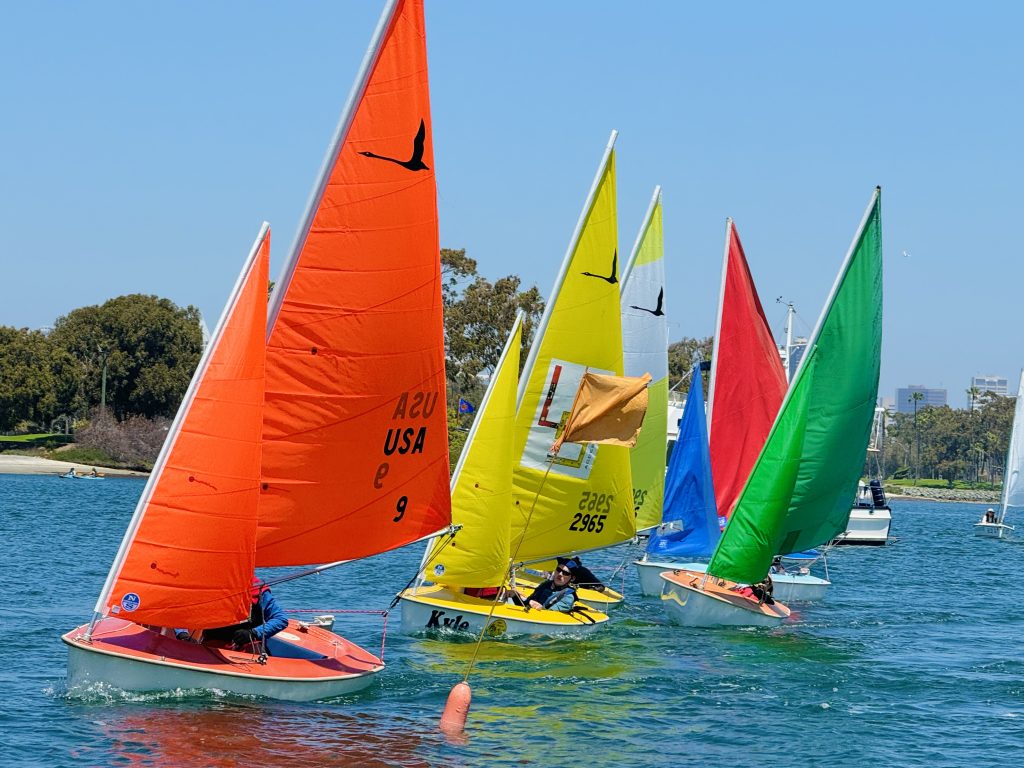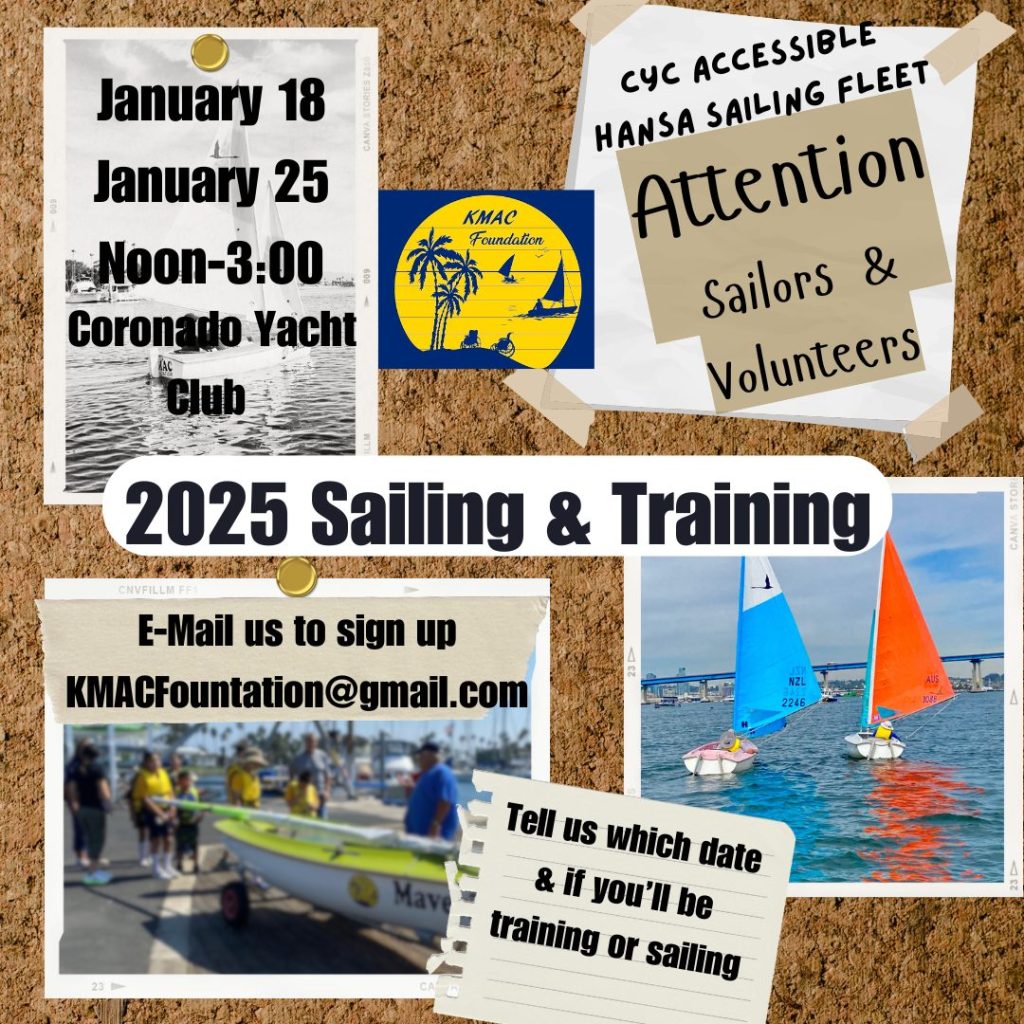When asked what his role is in the KMAC Foundation, Jamie McArthur laughs, “It depends on who you ask, I have lots of roles. Because no one else would do it, I am the president of the KMAC Foundation.” Jamie started the foundation with a group of others in 2018 as a way to memorialize his son Kyle’s legacy.
About the KMAC Foundation
Lt. JG Kyle McArthur led a full and joyful life. He attended Coronado schools, the Naval Academy and participated in many sports. Kyle was an avid sailor and enjoyed spending time with his family on the water. He was involved in a fatal automobile accident in 2013, however, he touched more lives in his brief time on earth than many accomplish in a lifetime. It’s our vision that through the annual KMAC regatta and this foundation we can share his love of sailing and make a difference in the lives of others who want access to the sport of sailing.

Challenged Sailors of San Diego
Jamie shares that he worked with Challenged Sailors San Diego for 10 years before founding KMAC Foundation. “They are other adaptive organizations over in San Diego. They do a great job, and a lot of their people help us, and we help them. Challenged Sailors participate in at least two of our regattas. We just thought we could do it a little differently with the boats in Coronado.
“I had access to a Yacht Club out of a commercial Marina. We had access to dry sailing, which is when small boats come out of the water after sailing each day and they are rinsed off and covered up. [Challenged Sailors San Diego] program keeps the boats in the water and that’s much tougher on maintenance, etc. I did all the maintenance for them for 10 years. We actually brought them over to Coronado, pulled them out of the water, put them on a trailer, and did an annual cleaning and painting. [Challenged Sailors San Diego] wanted to keep their program over there. They have an unbelievable group of volunteers and administrators. We thought we could do it a little differently, we have very different boats. We have Hansa sail boats.”
Kyle’s Legacy
Jamie decided to carry on Kyle’s legacy through the KMAC foundation with adaptive sailing. When asked how Kyle first became involved with sailing, Jamie jokes, “Because I needed a crew for my boat!”
He boasts about his son, sharing that Kyle was one of the youngest sailors ever at the Coronado Yacht Club. “When Kyle was five years old, he was jumping in a boat and sailing. He actually won the Southern California under-12 championships when he was 11 years old. He was not a favored kid to win, he took it kind of out of the blue. I was on active duty as a coast guard, and I was over at the Navy base when it happened. I show up at the Yacht Club thinking he backed into the regatta but they’re like ‘Kyle kicked ass.’”
Jamie says, “I didn’t spend $1,000 on his boat. He had an okay boat, but it wasn’t a rocket ship. He just sailed consistently and against kids – well guys now in their 30s and 40s – that are world champions. But he was into other sports: football, baseball, and lacrosse. Although we would go to Catalina all the time. He loved sailing and swimming, but other sports were really his passion by 6th/7th grade. Kyle would crew occasionally, but he was not a Yacht Club brat. He was down at the baseball diamond, on the football field, or playing lacrosse. I supported that and a lot of the teams I coached.”
KMAC Foundation Sailings & Trainings
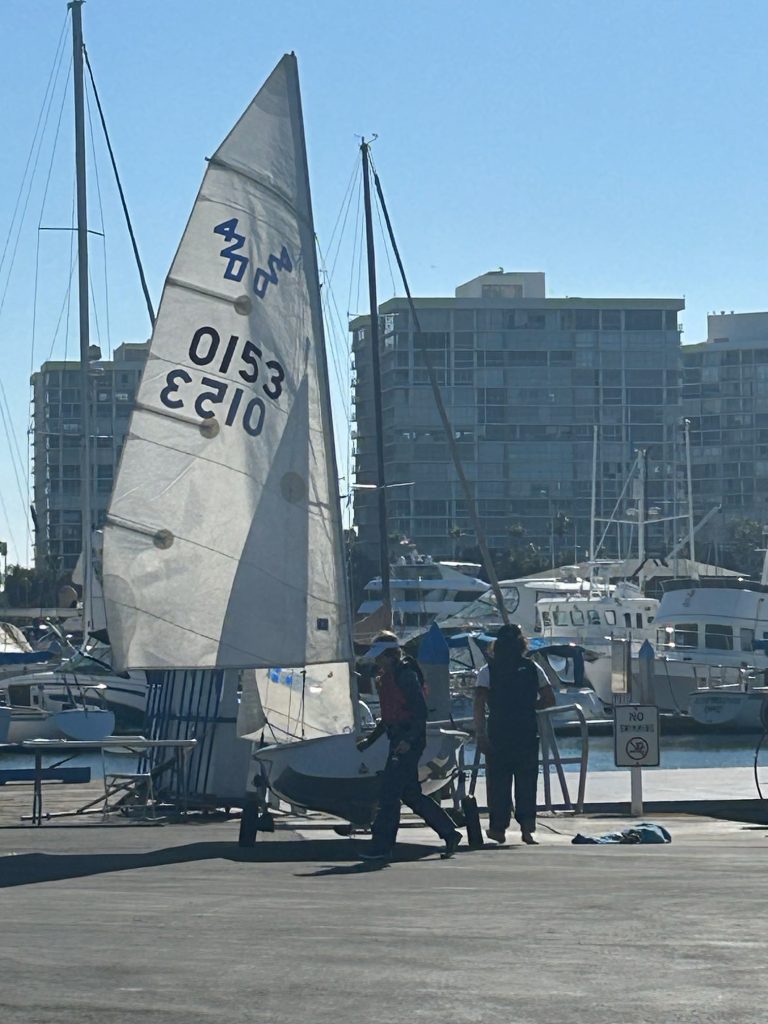
While the foundation tries to limit their activities to every other weekend, Jamie shares there are a lot of exciting opportunities coming up. On January 18, they had their first sailing and training of the year. They will also have one on January 25. The following week the non profit will participate in the US sailing symposium down at the Loews resort.
Quick Facts – Sailing Leadership Forum 2025
Regarding the symposium, Jamie shares, “It’s a national symposium about sailboat racing, not just adaptive sailing. It’s huge and we have a part in that. We’re participating but we’re also doing a demo event of our classes of adaptive sailing at the yacht club.”
Afterwards, Coronado native and Olympic bronze medalist Hans Heneken will be in town. “Hans’ team will be training for a couple of days in Coronado using our boats. Then they are going to the sailing Hansa World Championships. They are in March in Sydney, Australia. They’re going to train here before they take off for Australia and so there’s going to be some really good disabled athletes.”
Coronado Native, Hans Henken, Sailing Toward the 2020 Olympics (April 2019)
Also stopping by Coronado is Unstoppable Tracy. Jamie says, “Tracy Schmitt is coming in. She’s a motivational speaker and she was born without fully developed limbs, so she has prosthetics. She is the epitome of somebody, and they’re all like this, that say ‘I don’t care about my disability- watch me.’ She’s a motivational speaker and a world class sailor. She’s coming down to participate.”
KMAC Foundation Board & Success
Jamie talks about the organization and the athletes they help. “We had a board meeting last night and we have a guy that was hurt in a climbing accident. He’s been in the chair for 20 years now and he just loves sailing. He wasn’t a sailor before but that’s the thing with sailing, getting in an adaptive boat allows you to be just a regular sailor. You can go out and compete or just go sailing. We keep talking about racing and that’s more my background in the sailing world, but going sailing, dinking around Glorietta Bay and going under the bridge. It’s such protected waters and the weather most of the time is delightful. Whatever floats your boat!”
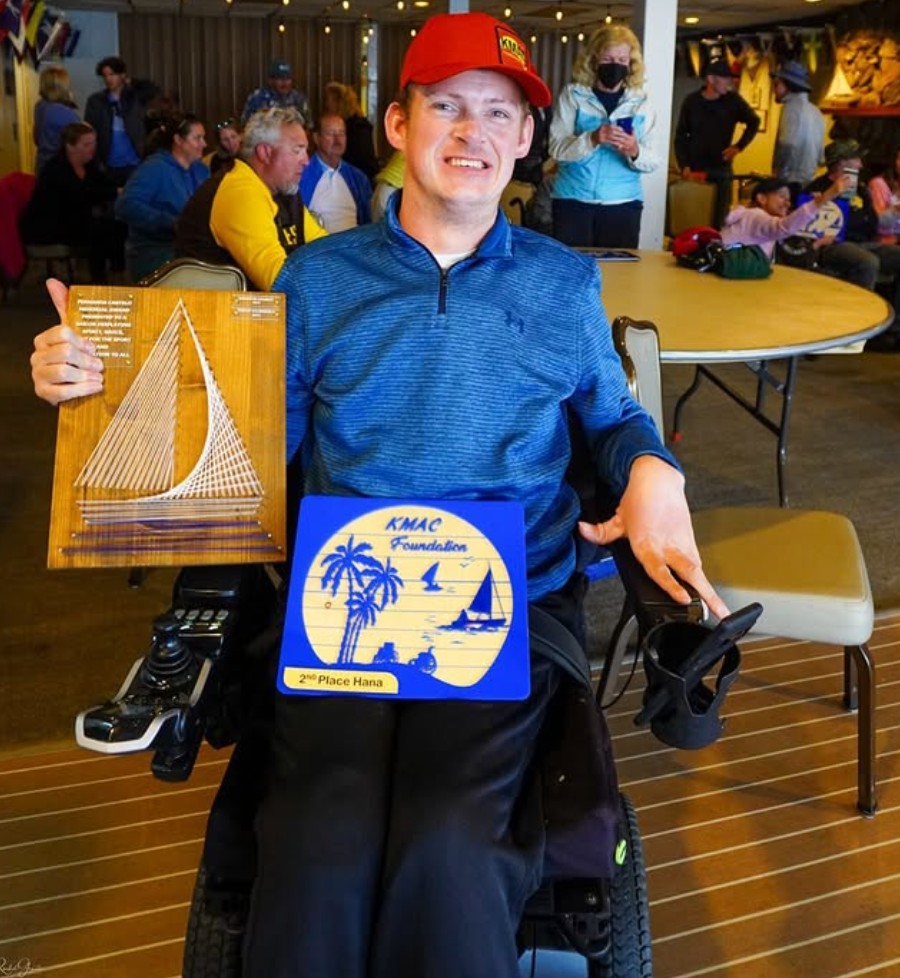
Another board member is Damen who lives in Bellingham, Washington. He is an engineer and runs his own company. Jamie says, “He’s kind of a late bloomer in sailing but he loves it. He’s as capable as any engineer on the planet, but because of his disease he needs some help to get on a boat and go sailing. He loves it so much.”
Someone else Jamie is proud to see in the program is Kai. He says, “I have our star pupil, little Kai. He came to us when he was two years old, he has spina bifida. You couldn’t understand him when he was two. Now he is a first grader, and he has his own wheelchair, he cruises around. When he first started coming to the sailing events, he thought, ‘look at all these big people in these chairs, they’re just like me.’ Now he’s in first grade and his speech is unbelievable. He’s smarter than a whip.”
Kai & The KMAC Foundation
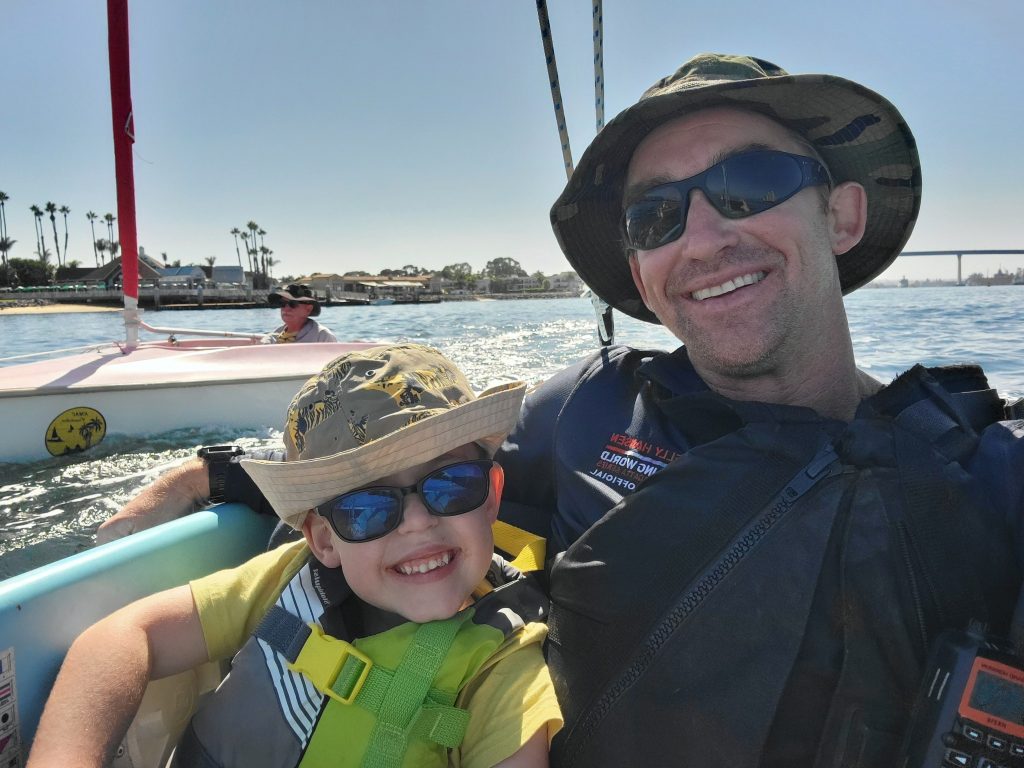
Kai’s father and board member Steve McDonald shares, “Jamie and the KMAC Foundation have provided Kai and I an opportunity to get outdoors and be competitive in a sport that has a bright future for adaptive athletics. Sailing is a skill-based sport, and the boats that KMAC provides are easy to sail and require very little physical ability, which provides a very level playing field for athletes with different physical capabilities. I was an athlete in college, and I am excited to pass on the lessons I learned through athletics to Kai such as: independence, competitiveness, hard work, dedication, and being a good sport. KMAC has given us our first really inclusive sporting activity to do so. Kai can’t quite sail by himself yet, but it is only a matter of time before he is out on the water winning regattas by himself.”
The Experience
Jamie explains what the experience is like for those they help. “If you can drive the boat around, you can go here and go there. If you’re competitive, you can jump in a race or just have a good time and then come back to the dock. Then go out to the bar and have a beer. It’s really cool to go into the bar, mainly during our regattas, and you’ll see 15 people in wheelchairs having a cocktail and talking smack about what happened out there. They’re sailors. They talk about what happened. ‘How was that?’ or ‘ how did you adjust this?’
Jamies says, “Wounded Warriors are also a big part of us. We have two Wounded Warriors on our board. We bring them to the big regatta in April. We’ll have about 20 wounded warriors on 22 foot boats with a qualified captain. They learn how to crew real quick and they just dig it!”
Whether sailors want to race or just sail, Jamie assures there is a place for them. “Sailboat racing sometimes can be kind of boring, but they just get so into it. It’s a non-threatening event because we do not tolerate people dropping F bombs or threatening. You’d be surprised, I mean it’s competition, people can get a little heated. Raising your voice a little bit is not a big deal, but if you push that limit, we drop the hammer on you.”
Jamie explains, “We don’t need people doing that here. These people are wounded warriors and disabled people. They’re going through enough crap. The volunteers don’t need it, so either clean up your act or just don’t come back. Although, that’s very rare that we actually have to have words with somebody.”
Coronado Community
One of the special things about Coronado is the way the community comes together. Jamie shares, “We have a guy on our board who has cerebral palsy. Steve Wampler and his Stephen J. Wampler Foundation, which hosts a camp for kids with physical disabilities. I mean it’s unbelievable. He’s a mountain climber too. We’re learning from his business model. We met with him about a month ago and it’s just amazing. You’ll see people with missing limbs and cerebral palsy. Some had MS (multiple sclerosis) late in life. Whatever it is, they just they said ‘screw that, let’s go sailing.’”
The Wampler Foundation Celebrates 20 years of Inspiring Limitless Potential
Volunteers Needed
When asked what experience volunteers need to have, Jamie is adamant that no sailing experience is required. He assures, “Everybody has experience in something. One of our big needs is administration. Tax letters, putting computer posters together, the community calendar and that kind of stuff. If you don’t know how to sail or don’t like boats, but you like being at the desk or fundraising, you can volunteer! Or if you want to learn, OK I’ll throw you in one of these boats with an experienced sailor and we will teach you how to sail! Then you can move on to the next level of helping a disabled sailor.”
Jamie’s approach to volunteers comes from his own experience. “I volunteer on the USS Midway Museum and they treat volunteers so nicely. They’re very flexible with schedules, they give us little parties – that’s how we get paid, they throw parties. I just spent almost three months up in Bellingham, so I didn’t do any work with Midway. When I had duties yesterday, nothing changed. I just show up on duty schedule and go do my thing. I’m a docent and all I do is just chat with people.”
He continues, “You have be flexible. If they only make it once every three months, okay! As long as they show up and contribute somehow. I’ve never seen a volunteer show up and not do anything. We’ll put you to work, either picking up on a boat and moving it or pushing paper. When we have regattas, we push a lot of paper because you have the registration and organized events. If a volunteer can fog a mirror, we can use them. The key to these organizations is volunteers. We have a volunteer event at the Yacht Club on January 25.”
KMAC Foundation – For Accessible Sailing in Coronado




